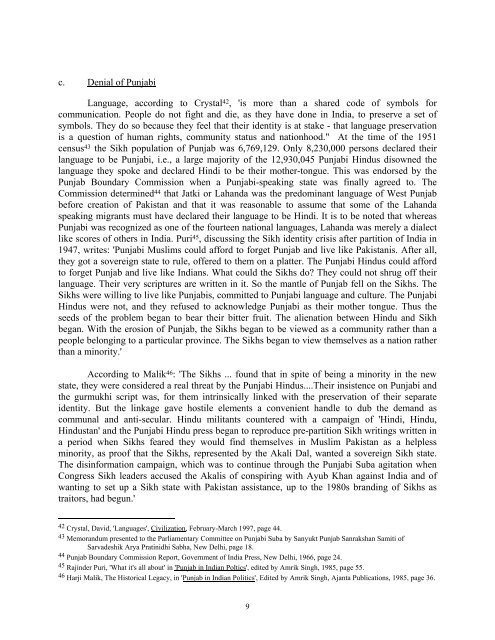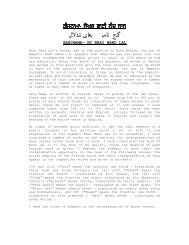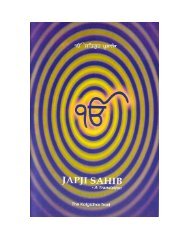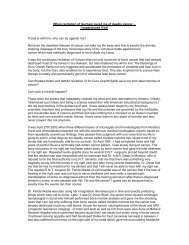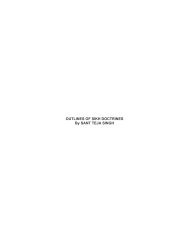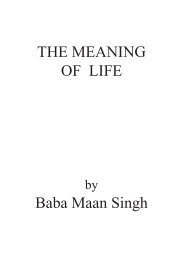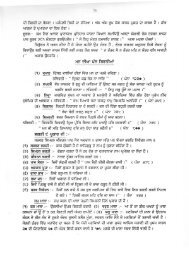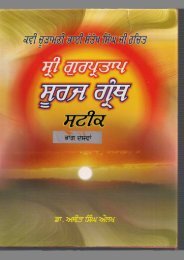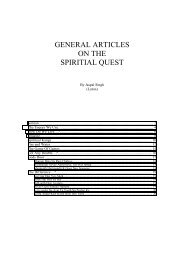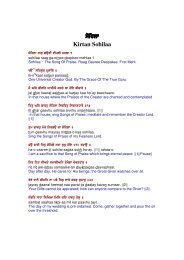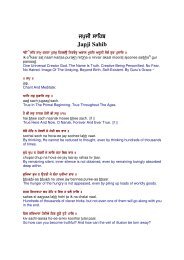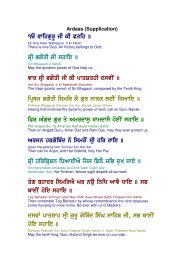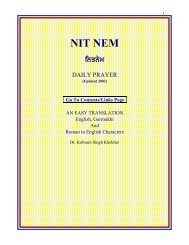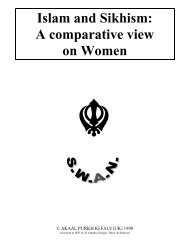Sant Jarnail Singh Bhindranwale - Sikh Missionary Society (UK)
Sant Jarnail Singh Bhindranwale - Sikh Missionary Society (UK)
Sant Jarnail Singh Bhindranwale - Sikh Missionary Society (UK)
You also want an ePaper? Increase the reach of your titles
YUMPU automatically turns print PDFs into web optimized ePapers that Google loves.
c. Denial of PunjabiLanguage, according to Crystal 42 , 'is more than a shared code of symbols forcommunication. People do not fight and die, as they have done in India, to preserve a set ofsymbols. They do so because they feel that their identity is at stake - that language preservationis a question of human rights, community status and nationhood." At the time of the 1951census 43 the <strong>Sikh</strong> population of Punjab was 6,769,129. Only 8,230,000 persons declared theirlanguage to be Punjabi, i.e., a large majority of the 12,930,045 Punjabi Hindus disowned thelanguage they spoke and declared Hindi to be their mother-tongue. This was endorsed by thePunjab Boundary Commission when a Punjabi-speaking state was finally agreed to. TheCommission determined 44 that Jatki or Lahanda was the predominant language of West Punjabbefore creation of Pakistan and that it was reasonable to assume that some of the Lahandaspeaking migrants must have declared their language to be Hindi. It is to be noted that whereasPunjabi was recognized as one of the fourteen national languages, Lahanda was merely a dialectlike scores of others in India. Puri 45 , discussing the <strong>Sikh</strong> identity crisis after partition of India in1947, writes: 'Punjabi Muslims could afford to forget Punjab and live like Pakistanis. After all,they got a sovereign state to rule, offered to them on a platter. The Punjabi Hindus could affordto forget Punjab and live like Indians. What could the <strong>Sikh</strong>s do? They could not shrug off theirlanguage. Their very scriptures are written in it. So the mantle of Punjab fell on the <strong>Sikh</strong>s. The<strong>Sikh</strong>s were willing to live like Punjabis, committed to Punjabi language and culture. The PunjabiHindus were not, and they refused to acknowledge Punjabi as their mother tongue. Thus theseeds of the problem began to bear their bitter fruit. The alienation between Hindu and <strong>Sikh</strong>began. With the erosion of Punjab, the <strong>Sikh</strong>s began to be viewed as a community rather than apeople belonging to a particular province. The <strong>Sikh</strong>s began to view themselves as a nation ratherthan a minority.'According to Malik 46 : 'The <strong>Sikh</strong>s ... found that in spite of being a minority in the newstate, they were considered a real threat by the Punjabi Hindus....Their insistence on Punjabi andthe gurmukhi script was, for them intrinsically linked with the preservation of their separateidentity. But the linkage gave hostile elements a convenient handle to dub the demand ascommunal and anti-secular. Hindu militants countered with a campaign of 'Hindi, Hindu,Hindustan' and the Punjabi Hindu press began to reproduce pre-partition <strong>Sikh</strong> writings written ina period when <strong>Sikh</strong>s feared they would find themselves in Muslim Pakistan as a helplessminority, as proof that the <strong>Sikh</strong>s, represented by the Akali Dal, wanted a sovereign <strong>Sikh</strong> state.The disinformation campaign, which was to continue through the Punjabi Suba agitation whenCongress <strong>Sikh</strong> leaders accused the Akalis of conspiring with Ayub Khan against India and ofwanting to set up a <strong>Sikh</strong> state with Pakistan assistance, up to the 1980s branding of <strong>Sikh</strong>s astraitors, had begun.'42 Crystal, David, 'Languages', Civilization, February-March 1997, page 44.43 Memorandum presented to the Parliamentary Committee on Punjabi Suba by Sanyukt Punjab Sanrakshan Samiti ofSarvadeshik Arya Pratinidhi Sabha, New Delhi, page 18.44 Punjab Boundary Commission Report, Government of India Press, New Delhi, 1966, page 24.45 Rajinder Puri, 'What it's all about' in 'Punjab in Indian Poltics', edited by Amrik <strong>Singh</strong>, 1985, page 55.46 Harji Malik, The Historical Legacy, in 'Punjab in Indian Politics', Edited by Amrik <strong>Singh</strong>, Ajanta Publications, 1985, page 36.9


